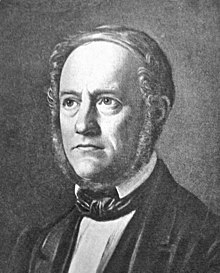Carl Ploug | |
|---|---|
 Carl Ploug in 1912. Credit: Constantin Hansen | |
| Born | 29 October 1813 |
| Died | 27 October 1894 (aged 80) |
| Resting place | Vestre Cemetery |
| Occupation(s) | Journalist, writer, poet, politician |
| Spouse |
Frederikke Elisabeth Michelsen
(m. 1854) |
Carl Parmo Ploug (29 October 1813 – 27 October 1894) was a Danish poet, editor and politician.
Ploug was born in Kolding, Denmark, to assistant professor and future head instructor Christian Frederik Ploug (1774–1837) and Parmone Caroline née Petersen (1784–1860). On 6 July 1854 he married Frederikke Elisabeth née Michelsen (1834–1904) in Vartov Church. He graduated in 1829, after which he studied language and history.
In 1839 he became a contributor to the National Liberal magazine Fædrelandet. Ploug was a member of the Danish Constituent Assembly in 1848, where he belonged to Orla Lehmann and Henrik Nicolai Clausen's branch, which is usually referred to as the "left wing" of the National Liberal party.[1] Ploug was a member of Folketinget from 1853 to 1857, and a member of Landstinget almost continuously from 1859 to 1890.
He gave the war of 1864 his warmest support, and he encouraged the people to fight, partly in the blind belief that Sweden would come to Denmark's military aid. The "brotherly people" did not, and the defeat of Austria-Prussia gave him a serious blow. When the National Liberals' proposal for a constitutional amendment was not adopted by Rigsrådet ('the Council of the Realm'), Ploug urged national unity to protect what remained of the fatherland, and therefore supported the conservative proposal, which was adopted as the Constitution of 1866.[2][3]
As a young man, Ploug was strongly committed to personal freedom and advocated universal suffrage (for men), but over the years he went in a more conservative direction. For example, he was vehemently opposed to women's suffrage, and at the opening of the Landsting in 1888, his rejection of women's suffrage was adopted by 34 votes to 14.[4] He suddenly fell ill on 27 October 1894, a few days before he was due to unveil the bust of Jens Christian Hostrup at the Regensen, and died the same day in Copenhagen.
- ^ Glenthøj 2014, p. 195.
- ^ Elmegaard Bladt, Lene (15 August 2011). "Carl Ploug, 1813-1894". Aarhus University: danmarkshistorien.dk (in Danish). Archived from the original on 17 June 2021. Retrieved 6 May 2022.
- ^ Cite error: The named reference
:2was invoked but never defined (see the help page). - ^ "Biografi på Arkiv for dansk litteratur ved Sven Rossel". Archived from the original on 7 August 2007.